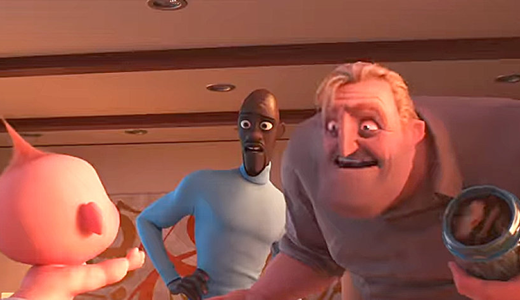Incredibles 2 is officially out now, and just in time for Father’s Day. Great timing, really. Like a lot of Pixar movies, this one has a whole lot to say about fatherhood. Indeed, I think it’s film’s emotional core.
It’s a bit ironic, given that the Incredibles 2 storyline focuses on Mama Incredible, aka Helen Parr, aka Elastigirl. Given an opportunity to become the face of a movement to get superheroes legalized again, she leaps at the chance. After decades of arguably laboring in the ample shadow of Mr. Incredible (her husband, Bob Parr), she has the spotlight for herself this time ’round—obviously a reflection of the real-world changes we’ve seen in gender equality and society as a whole.
All that leaves Bob in an unusual place: at home. While Helen races off to do battle with the evil Screen Slaver, Mr. Incredible is left to fight with Dash’s homework, smooth the ruffles in Violet’s love life and try to keep baby Jack-Jack from traumatizing every raccoon within laser eyeshot.
Turns out, punching villains is easy: It’s fatherhood that’s hard.
Throughout its history, Pixar has been preoccupied with issues of family, and fathers (as well as father figures) have long been instrumental to Pixar’s stories. These films not only tell us that dads are really, really important to their sons and daughters, but they remind dads of how to be a good one.
Marlin, the ever-worried clownfish in Finding Nemo, is perhaps Pixar’s best-known dad—but that doesn’t make him the best of dads. He means well, of course, but because he’s so worried about his son, Nemo, getting hurt or lost that he squelches the kid’s growth. Nemo already has a disfigured fin: Marlin’s overprotection risks stunting Nemo emotionally, too. Only when Nemo gets whooshed away from the safe confines of the coral reef does Marlin become a real hero. And he learns (and teaches) a valuable lesson in the process: Life is dangerous, but your kids are more capable than you know.
It echoes something that Jim Daly wrote in a book we worked on together, The Good Dad:
This could get me in trouble, but I think a dad isn’t necessarily his best when he helps his child sit in a tree. He’s at his best when he lets them climb it on their own.
Pixar reminds us that dads sometimes can (as the Bible might put it) exasperate their children, too. In Ratatouille, Django doesn’t appreciate son Remy’s love of cooking. In Inside Out, Riley’s father becomes the unintentional catalyst for his daughter’s emotional breakdown. (Riley’s mother tells her that she wants Riley to be happy to help support him.) And in Up, Wilderness Explorer Russell’s divorced dad is apparently not very involved in Russell’s life much anymore.
But Russell does find an important father figure in cranky old guy Carl Fredricksen, who (in one of the movie’s myriad of tear-jerking moments) takes the kid out for ice cream at the end of the movie—just like Russell and his dad used to do. Lightning McQueen doesn’t even have a dad in Cars, but he finds a surrogate one in the wise, cantankerous Doc Hudson. And often the real dads in Pixar come around, too. Django eventually embraces Remy’s gastronomical gifts, and Riley’s dad tells Riley that it’s perfectly OK to be sad sometimes.
It’s OK for dads to be sad, too. Incredibles 2 tells us so.
Mr. Incredible doesn’t feel like an incredible father throughout most of the movie. Frustrated and sleep-deprived, he reveals his insecurities to Violet, who had no clue, really, of how hard he was working in Mom’s absence.
“I just want to be a good dad,” he confesses, shoulders slumped, eyes already half-closed.
“You’re not good,” Violet tells him. “You’re super.”
Here’s something else Daly talked about in The Good Dad that stuck with me: We dads fail sometimes. We don’t want to. We never mean to. But we do. That’s just … life. Life in a fallen world.
But you know what we do when we stumble or fall? We get back up and try again. Like Bob in Incredibles 2—like any hero worth his or her salt—we don’t give up. We fight the good fight and, when we lose, we wake up the next morning and fight again. That’s what makes us the dads our children want and need: Not perfection, but persistence. The willingness to try to get a little better at our most important job each and every day.
That’s what heroes do. And every dad can be a hero.






Recent Comments